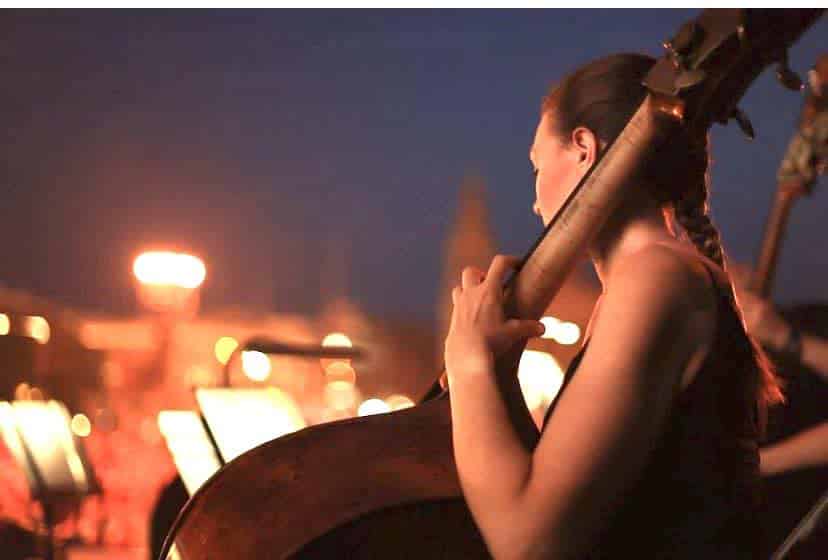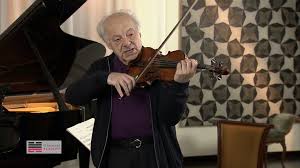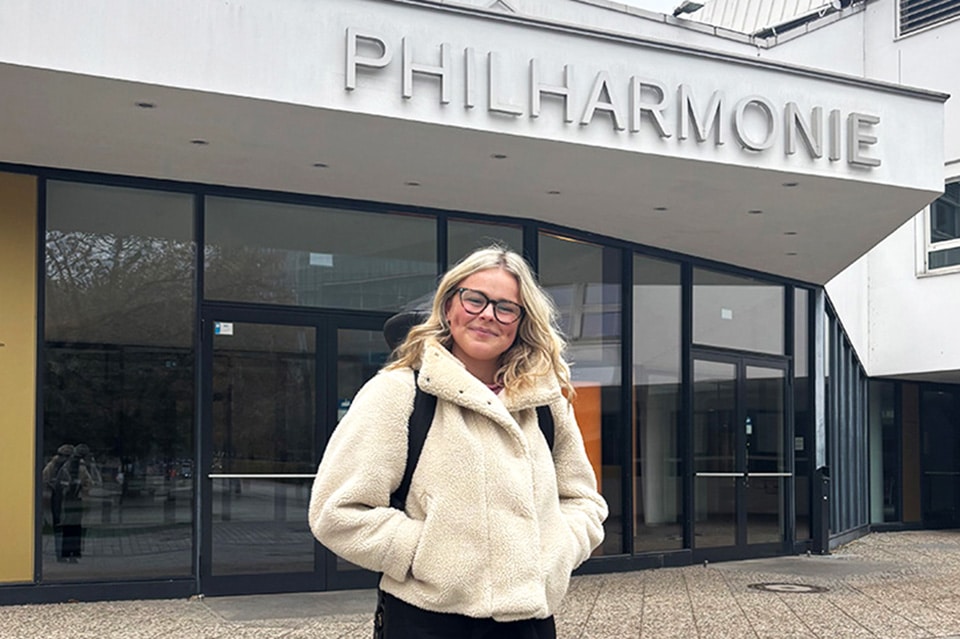Is there a lovelier (or more typical) Yiddish song?
mainIt’s no secret that I’m making a three-part series on Music and the Jews for BBC Radio 3, and what a voyage of discovery it’s turning into.
Tonight, BBC1 will show a documentary on the Jews who made the Broadway musicals. Must be something in the air.
With these considerations in mind, let me offer a new video performance of what I think is the archetype Yiddish lullably, Almonds and Raisins. The soprano is Talia Dishon, in the vocal quartet Alla Breve. See what you think.






Excellent. Maybe too good to fall asleep to, though!
Five stars.
Translations readily found on line.
Personally I don’t care for this modernized, pasteurized treatment, it takes the smell of kugel and cholent out of the piece, there’s hardly anything musical to distinguish it as a yiddish song. I prefer this kind of delivery, from 1928
http://youtu.be/mNKNypH1Juo
Misha says “Personally I don’t care for this modernized, pasteurized treatment, it takes the smell of kugel and cholent out of the piece .” Considering that Goldfaden wrote it in the USA in the teens of the 20th Century and the sensitivity and warmth with which this quartet sing the arrangement – so redolent of an East European Fraygish mode, I cannot begin to understand where you are coming from.
The Jewish intellectual brilliance I find in Klezmer is here also in a vastly different format…mic placement uneven unfortunately, should be four of them.
Excellent voices blend with rare format lovingly.
@ Misha
Thanks, good to hear some Klezmer ,,, overall prefer the soft exotic first video because it’s new and somehow soothing to me but give me plenty of both!
Too different to compare really.
Vos soll ich z’gn. Mit trayeren and gelechter a scheinem Dank!
I don’t like this much. Good singing but inauthentic…. Try this…It is a Varshwundene Welt
https://www.youtube.com/watch?v=hDZJq6Hc9QI
More Andrews Sisters meets George Melachrino via Radio City 1930 rather than a mud hut in a kleininke stetl just south of Chelm. But at least their pronunciation is a feine heimische Galicianer mamme looshen!
Good voices, better acapella … those violins are directly out of a fifties Nat King Cole hit…where they should stay.
Don’t care for the arrangement at all, especially the male parts (more English Chapel than traditional Yiddish folk)
I always loved the Perlman disc “Tradition” which is a wonderful and beautifully arranged celebration of Yiddish themes.
http://www.youtube.com/watch?v=uH8nYAAz0Vs&list=PL04Kz00dYCpBCoLX5jd3Lf0ASozB6QIFW
“English Chapel” passt em az vi a hind tzitze kanfes, matthew. You’d never find a melodic line or an East European harmonic blend in Byrd or Dowland – not even from the blinding genius of a Purcell. Sorry
The Alla Breve sounds like a dirge instead of a lullaby. It is supposed to be a mother singing a lullaby not a group of vocalists hijacking what is an allegorical statement set as a lullaby. This rendition (pick your own definition of this word) is in a word “feh”
If you would like to listen to more beautifully sung yiddish songs, try to find anything from the (very old) Album of Belina and Siegfried Behrend ” Es brennt” . “Rozhinkes mit Mandlen” is just one of the songs on it, and the two perform it in a way that will make your toes curl. I found no Youtube version, though, but I still have it on Vinyl from way back (70ties I think).
Misha,
could I ask you give me direct link to the clip for Mein Shtetele Belz? (My grandfather wrote it)
Michael: Just click on the bottom right corner of the video, on the red and white YouTube logo, which will take you to the clip directly.
http://www.hebrewsongs.com/?song=beltsmaynshtetelebelts
@Misha – agreeing completely. I come from a line of Yiddish writers and singers – and miss the Klezmer element which just must be there. Why is no one mentioning Theodore Bikel and Martha Schlamme? but thanks for starting this whole discussion.
To all the outraged yids above me: for your information, it is permissible to play performances of yiddish songs that are not from 1928, 1952 or even 1976. It is even allowed to sing in yiddish without supplementary ‘krechtsen’ and various other Americanized mannerisms that you perceive as authentic.
Norman, will there also be a section on the Jews and the music of Morocco (David Bouzaglo, Haim Look), Algeriia (Lili Boniche, Reinette L’Oranaise, El Gusto people), Tunisia, Egypt (Daoud Hosni, Leila Murad, Mounir Murad and countless others), Yemen (and then not only Ofra Haza, Zohar Argov or Noa, or for that part Dana International) and Iraq (Yousef Zaruur, Sayun – Zion – Cohn, Hugi Petaw, Fulful Gurgi, Yousef Al Amari, Selima Murad, the Kuwaity Brothers, etc. etc. etc. etc).for instance. A vast territory often neglected when the West thinks of music and the Jews.
yes.
“Rozhinkes mit mandlen” was one of the centerpieces of the Yiddish song program sung on tour by my wife, Janet. I freely admit to being prejudiced, but in my experience no singer I’ve ever heard (and I’ve heard many!) captured the gentle innocence and simple beauty of the song quite so magically as Janet did.
Non-Jewish by heritage as I may be, this is one refreshingly fulfilling chapter in the Arts Journal!!!
Greatest appreciation to all contributors herein.
Right from the opening I loved this interpretation! Gorgeous singing, thanks for sharing, Norman.
Of interest for research on the series may be “Russian and Jewish Songs” sung by Solomon Khromchenko (my teacher) recorded by Melodya in the 80’s.
He was an esteemed Bolshoi soloist in the 30’s and 40’s, rallied the troops with patriotic songs (1000 appearances!), gave a private concert for Stalin, fortunately passed the test, otherwise one would not have heard from him again, which would have been a personal loss for me and many others.
@ CJ
I wonder whether the context of Bolshoi here includes connection with the ballet company and whether a sample of his performances is available on youtube or elsewhere?
@richardcarlisle Khromchenko was not recorded as much as the other two prominent tenors, whatever politics may have been responsible for that. And of course, he was not allowed out of the country until the thaw of the 80’s. He did mainly Russian repertoire and as was the custom at the Bolshoi to do foreign operas in Russian. His granddaughter, Nadia Sikorsky, published some of his notes on voice development and interpretation of mainly Russian operatic roles. From an opera that is rarely heard in the West, “Aleko” the Song of the Young Gypsy: http://www.youtube.com/watch?v=xzDGF5gNu4Y
Also by Rachmaninoff the haunting “We Shall Rest”: http://www.youtube.com/watch?v=rQK6Wn-GlqU
I can’t help thinking how subversive such a message of transcendence would be to a totalitatian state.
http://youtu.be/-4Ytql3fKjo
@CJ
With recent time scarcity I’m gradually getting familiar with Kromchenko, found a youtube quite impressive listed above… there are others, will get back to you… thanks.
You should check out Alma’s quartet I posted.
Sp: Khromchenko